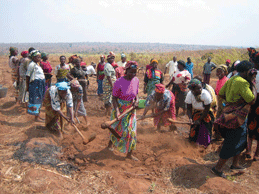
In his talk, Bolnick noted that SDI has tried to create a new plan that blends micro strategy and a rights-based approach.
Savings groups are a central part of the strategy, he said. They create a communality of purpose, build trust and accountability and establish conditions for engagement. These schemes also provide access to cheap credit if a member needs a loan.
Bolnick also drew attention to SDI’s Urban Poor Fund International, created in London in 2007 during a donors meeting facilitated by the Cities Alliance. The fund uses the social and political capital of these savings groups to leverage additional funds from banks, the national government, and international donor agencies that can be used for large-scale construction and infrastructure development.
Another aspect of SDI’s strategy that Bolnick highlighted was the importance of women’s participation as a foundation for collective action. He cited an example in Namibia, in which a community was approached to discuss residents’ needs. The men talked repeatedly about the need for land tenure. The women, on the other hand, wanted access to fresh water; they spent a good portion of their day walking from the community to a local water source. It was something that could be provided relatively easily that significantly improved their lives.
Documentation among the slum dwellers is crucial as well, Bolnick noted. He gave an example of an SDI railway slum dweller federation in Mumbai that meticulously collected information on its residents and shared same with municipal authorities. When city officials wanted to clear the slums on the railways to allow trains to pass more quickly, the federation was well equipped to participate in the process and negotiate an alternative living area for its residents.
On a broader level, Bolnick stressed the importance of exchange programs on the local, national and international level that allow communities to learn from each other’s experiences and share information. This type of exchange gives communities the opportunity to learn from those who know their situation best – other slum communities – and transfer successful approaches from the community to the city or global level.
SDI is a global network of federations of community-based organizations of the urban poor, with a presence in 33 countries. Through SDI, the communities can share experiences and strategies in achieving land tenure security, adequate housing, and basic services. SDI has been a member of the Cities Alliance since 2007.
For more about SDI and its new strategy for organizing the urban poor, please visit its website.




